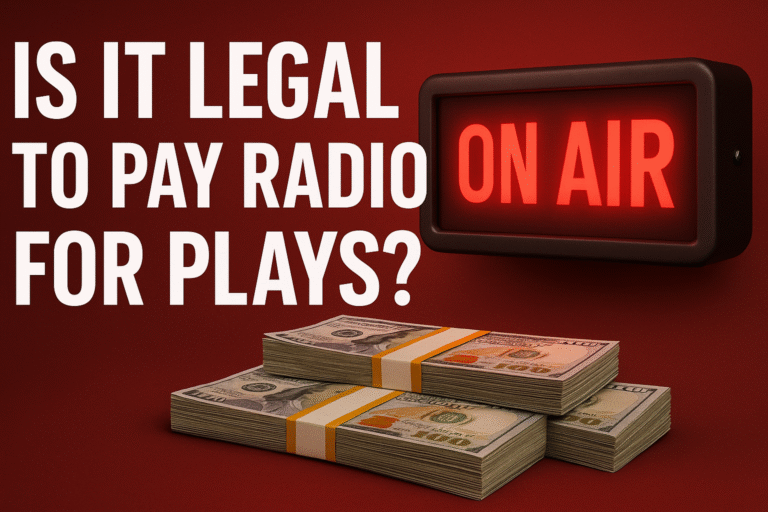Is it illegal to pay radio for spins? Here’s what FCC rules actually say about payola, sponsorship disclosures, and what stations can—and can’t—do.
The Law in One Minute
- Paying a station or DJ to play a song without telling listeners is illegal “payola.”
- U.S. law (47 U.S.C. §317) and FCC rules (47 C.F.R. §73.1212) require on-air sponsorship identification whenever money, services, or valuable consideration influenced the broadcast.
- In Feb 2025, the FCC again warned broadcasters: undisclosed paid airplay can lead to fines and enforcement.
What’s Allowed (and Common) When Disclosed
- Sponsored segments (e.g., “This hour is brought to you by ___”)
- Promotional tie-ins and contests supplied by labels/teams, if the station identifies the sponsor on-air
- Interviews/appearances connected to a paid campaign, with clear sponsorship disclosure
What’s Not Allowed
- Paying a programmer/DJ under the table for spins
- Gifts/trips/equipment in exchange for airplay with no disclosure
- Third-party middlemen hiding the source of payment
History & Enforcement
- Mid-2000s: state and federal actions against labels and radio groups, resulting in settlements and compliance plans.
- 2025: FCC enforcement advisory reminded stations that sponsorship ID rules still apply to modern promotions.
For Artists & Managers: Safe Ways to Promote
- Buy properly labeled ads (e.g., :30 spots) with the station reading “sponsored by ___.”
- Pitch editorial content separately from paid campaigns.
- Keep contracts/invoices that show who paid whom and for what.
- Ask stations to air the sponsorship line exactly as required.
About the “Recall/Money-Laundering” Rumor
We found no credible reporting of a nationwide “recall” or a new money-laundering crackdown aimed at radio spins. If you see a claim, check if it cites the FCC advisory about sponsorship rules—that’s real—but it’s not a “recall.”
Bottom Line
- Undisclosed pay-for-play = illegal.
- Disclosed sponsorships = legal.
- If you’re paying, make sure the audience is told—every time.




















0 Comments